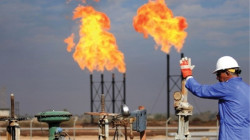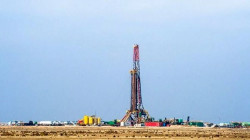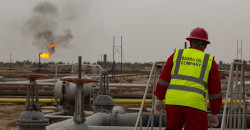Iraq’s budget in peril as Trump pressures oil markets

Shafaq News/ US President Donald Trump’s relentless drive to crash oil prices in a bid to bolster American industries could wreak havoc on Iraq’s fragile economy, experts warn, cautioning that sharp swings in global oil markets may deliver a heavy blow to Baghdad’s heavily oil-reliant budget.
Economists argue that Trump’s tariff-fueled strategy is designed to squeeze oil-producing nations into reshaping trade deals on Washington’s terms. While the move may give American manufacturers a competitive edge, it sends shockwaves through oil-dependent economies like Iraq, where over 90% of the national budget hinges on crude exports.
“If prices fall, the Iraqi government will struggle to secure funding and cover its budget,” said Hussein Al-Saabri, a member of the Iraqi Parliament’s Investment and Development Committee.
He told Shafaq News that Trump's tariffs ripple across global markets, indirectly affecting oil prices and, by extension, Iraq’s fiscal health.
Oil prices dropped to around $60 a barrel following Trump's tariff imposition, before a temporary 90-day suspension led to partial stabilization. Yet this swing caused global trade imbalances, said economist Mustafa Faraj.
“When tariffs were applied, global demand for goods dropped, taking oil demand with it,” Faraj told Shafaq News.
“As oil is subject to supply and demand like any commodity, prices fell accordingly. More fluctuations are expected in the coming days.”
Faraj believes Trump is using tariffs as a tool to force countries to the negotiating table, citing China as a prime example of increased pressure. As for Iraq, he advises diversifying revenue sources to shield the economy from external shocks.
Economic researcher Ahmed Eid echoed the call for reform, advocating domestic production growth, transparent taxation policies, and comprehensive restructuring of Iraq’s economic system.
“Any disruption in oil prices immediately affects Iraq’s finances,” Eid told Shafaq News. “This pressure has driven the government to expand its tax policy in hopes of offsetting deficits.”
Eid also revealed that Baghdad is considering new tax measures amid unstable oil markets—a move expected to impact imported goods prices and deepen the strain on Iraqi citizens already grappling with poverty and unemployment.
In response to Trump's tariff policy, the Iraqi government announced on April 5 a set of measures aimed at recalibrating economic ties with the United States, including expanding mutual trade by opening distribution channels for US companies and activating Iraqi commercial agencies to promote direct sector-to-sector engagement with the US.
The government also planned to develop banking and financial cooperation to ensure shared economic interests, as well as directing the Iraqi-US negotiating team to review the fundamentals of trade relations to build a balanced economic partnership.
In addition, assigning the foreign, finance, and trade ministries, along with other stakeholders, was another move to initiate dialogue with relevant US sectors, monitor financial markets, and consult with economic think tanks.
These measures mirror Trump’s hard-nosed approach to negotiation, rooted in a bid to rebalance the US trade deficit through high-stakes, bilateral deals.
Speaking from Paris, international legal expert Majid Boudin argued that Trump views America’s economic sovereignty as under siege—and sees tariffs as a blunt but effective weapon to reclaim it.
“Trump is laser-focused on funneling massive revenue into the US Treasury and slashing the national debt,” Boudin told Shafaq News. “He’s not interested in alliances—only in pushing America’s agenda.”
Boudin described Trump’s escalating trade war with China as part of a sweeping strategy to reignite US industrial dominance by imposing record-high tariffs.
Turning to Iraq’s position, Boudin pointed out that Baghdad’s economic lifeline remains tightly bound to oil and gas exports. “Trump is aggressively pursuing bargain-basement oil to drive down production costs and supercharge American competitiveness,” he said.
But Boudin warned that forcing prices below extraction costs could backfire, inflicting losses on oil producers. “That’s the battlefield in Trump’s next round of negotiations with Middle Eastern nations—Iraq included,” he concluded.





